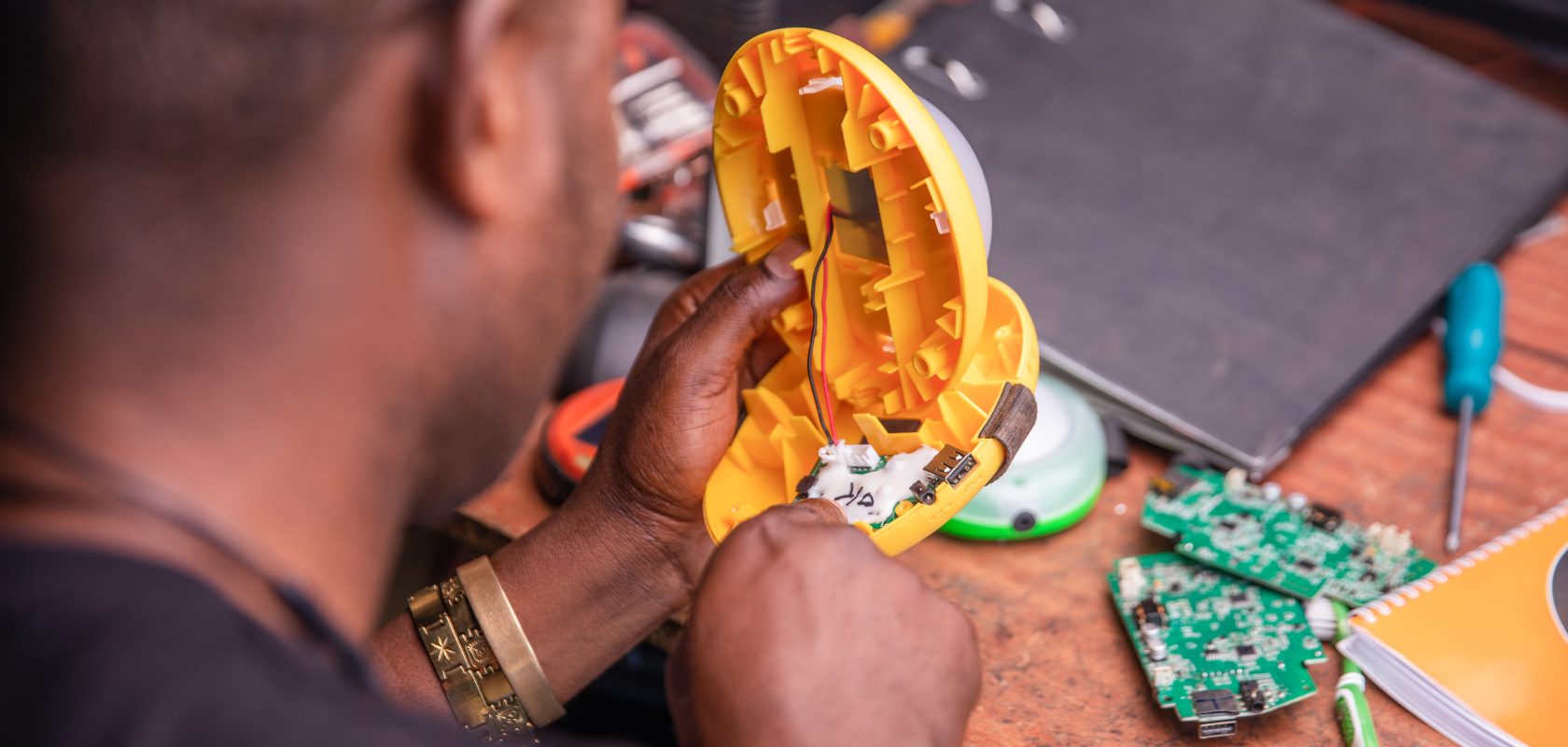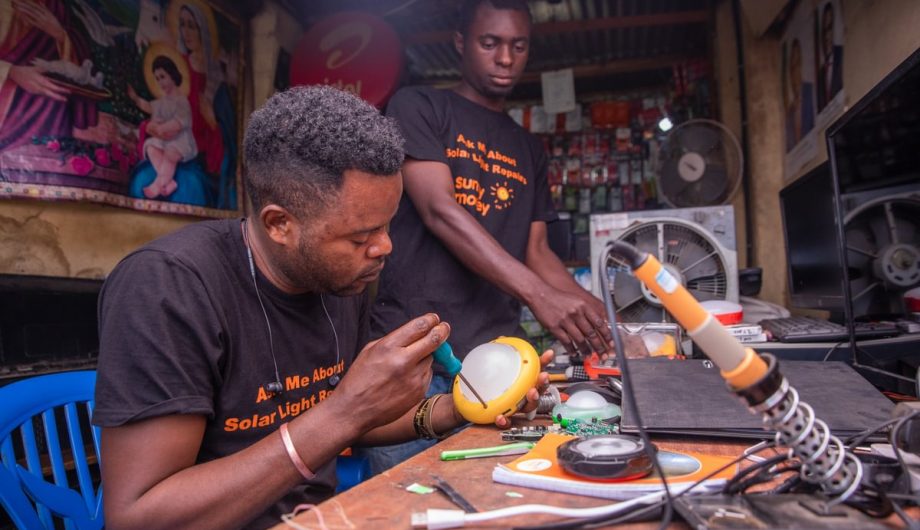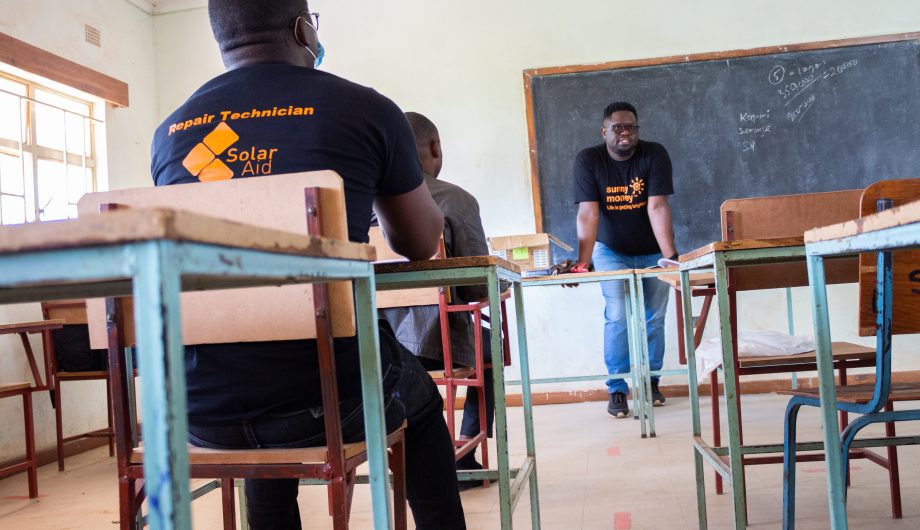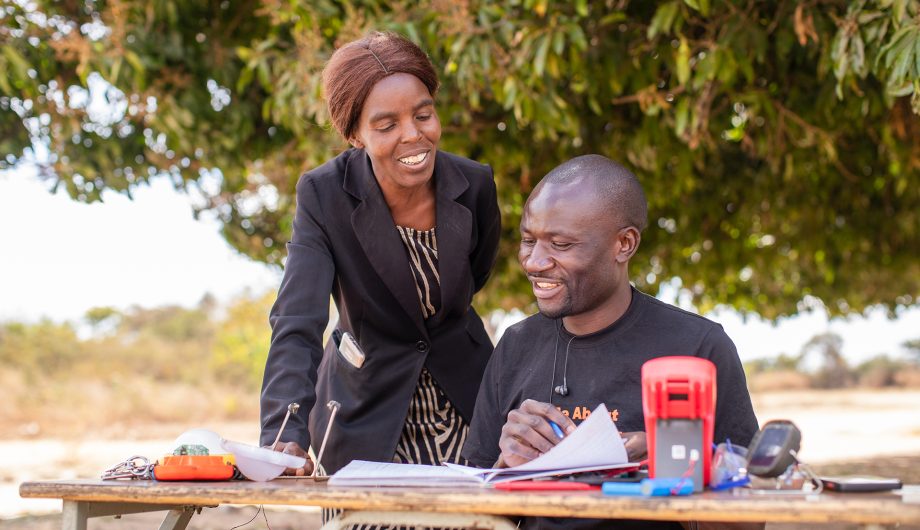Over the last decade, there has been an increase in the sale of small-scale off-grid solar products across the Global South, increasing energy access and decreasing the use of dirty and dangerous alternatives. But, this is posing a new question: what is being done to address solar e-waste to ensure that it is not contributing significantly to the growing issue of e-waste and, in the long run, climate change and environmental degradation?
For SolarAid, it is cardinal to take responsibility for what happens to these lights once they stop working.

Opened solar lamp at Muchinka Primary School in Serenje, Central Province. SolarAid/Jamiel Banda.
In Zambia, SolarAid has been working on a pilot solar light repair project named Solar Saver: Second-generation lights project since 2021, supported by the Deutsche Gesellschaft für Internationale Zusammenarbeit (GIZ) on behalf of the Federal Ministry for Economic Cooperation and Development (BMZ). The project aims to extend the life of small solar lights through better maintenance and repair for low-income Zambians, while combating the growing e-waste problem. The project has set up repair shops, trained local technicians in rural areas, and most recently held its first training to support solar agents to expand their businesses into repairing lights as well.
At this first capacity building training for current solar agents, SolarAid selected 15 of its top performing entrepreneurs from across the country. The training, held in Kapiri Mposhi town – about 200 km from the capital Lusaka, saw five women and 10 men meet in a central location for the first time for a 2-day intensive repair training.
This group of solar agents, who are used to spending their days selling lights, were taught to diagnose and repair broken solar lights. The training began with an overview of why repair is important – teaching the trainees about the growing problem of e-waste. They then learned how to diagnose a problem, test solar panels and batteries, and replace a battery. This will further allow them to educate their customers on the dangers of disposing of solar e-waste and the importance of repairs before deciding to do away with any faulty lights.

Solar Agents learning to test solar panels for faults. SolarAid/Emily Belis.
Many of the trainees expressed that prior to the training, they couldn’t repair any of the faulty lights that their customers would bring to them, as they had no repair background or knowledge, forcing them to focus solely on selling new lights. This, in the long run, made most of their customers go back to living in the dark and using dangerous light sources until they found some money to secure a new solar light.
“I am excited because now I can say I am an agent turned technician. I enjoyed the training, and it is very beneficial. With this training, I am very confident that I will now be able to do things like replacing the battery of a light, as this is the most common fault that customers would mention when they inquire about the possibility of repairing their old light(s),” said Mirriam Chikoya, one of the trainees who has been a solar entrepreneur since 2011.
Another agent, Benny Kalilombe, described the training as providing him with the tools he needed to fully serve his customers and “tell them about the dangers of e-waste” to the environment.

Solar Agents learning how to repair a faulty solar panel. SolarAid/Thomas Nyangulu Jr.
“Many of my customers would inquire about the possibility of repairing a light, or lights, they had grown attached to for a long time, and I used to feel bad as I couldn’t help them at the time… but now with this knowledge, it makes me happy that I would provide that diagnosis on their light and possibly bring it back to life,” said Benny.
Because the solar agents were meeting each other for the very first time, the training also gave them an opportunity to build community with others who understood their mission, sharing some of their challenges and best practices in their solar light businesses.
Overall, the 2-day intensive repair training not only provided the solar agents with knowledge on repair and e-waste, but also the tools to perform these repairs, and a community to do this work alongside. At the end, each of the 15 trainees received a repair kit which included all necessary repair tools as well as a repair manual for further support.

The first group of solar agents turned repair agents after completing their training. SolarAid/Thomas Nyangulu Jr.
The hope is that local repair practices, particularly among distributors such as solar entrepreneurs, will make a significant contribution to reducing solar e-waste in communities while giving second life to a clean, safe light source for those who do not currently have one.
_________________________________________________________________________________________________
Want to support our agents in Zambia to expand their businesses and reduce e-waste? Give today and watch your impact double with our match fund.



